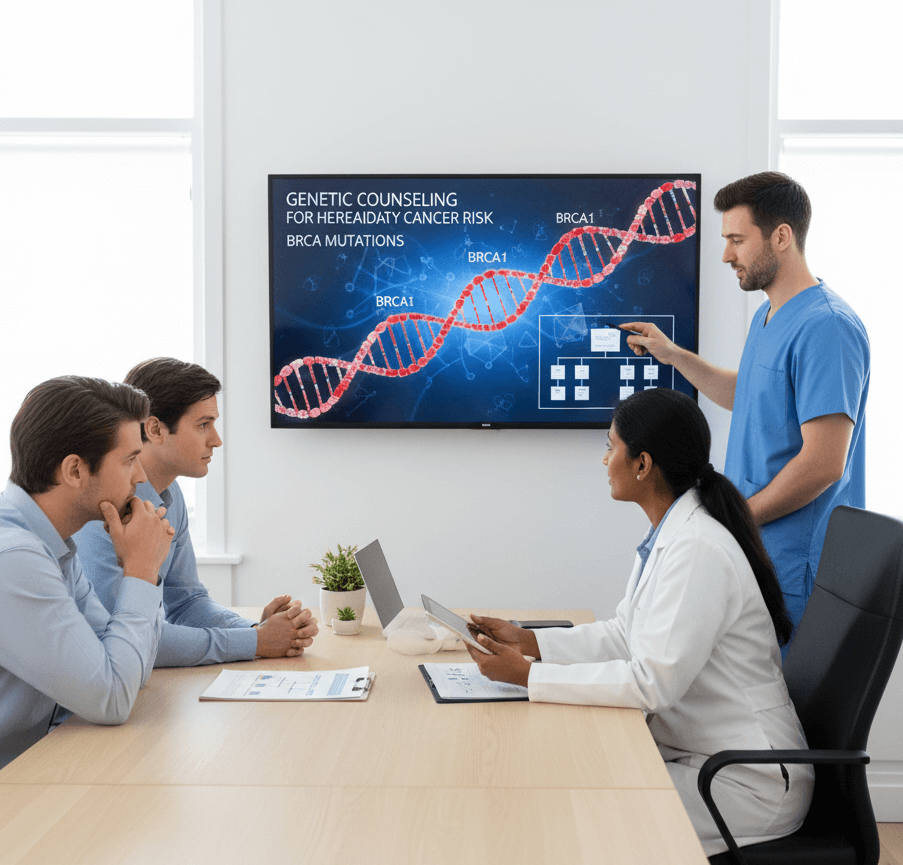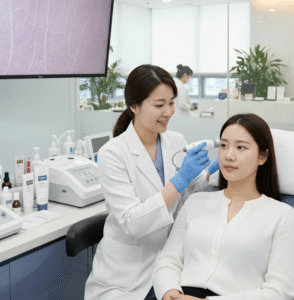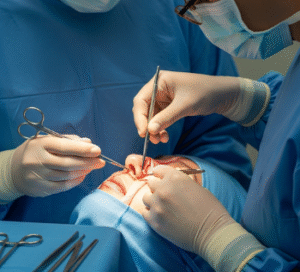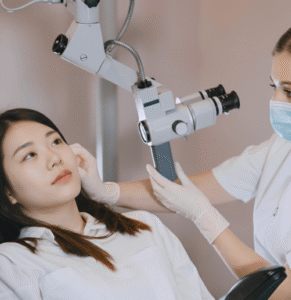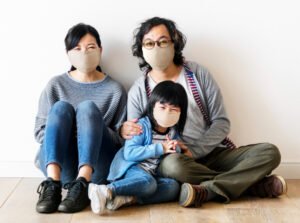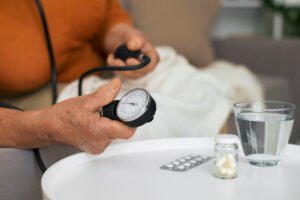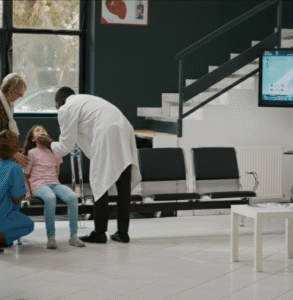What it is
Genetic counseling for BRCA mutations is a medical service that helps individuals and families understand their risk of hereditary cancers, particularly breast and ovarian cancer, linked to BRCA1 and BRCA2 gene mutations. These mutations significantly increase the lifetime risk of developing certain cancers.
In Korea, genetic counseling is provided in specialized cancer centers, women’s hospitals, and university medical institutions, often as part of a broader cancer prevention and management program. The counseling process includes risk assessment, genetic testing, interpretation of results, and tailored medical recommendations.
➡️ Key aspects of BRCA genetic counseling:
- Identifies individuals at increased cancer risk
- Provides education on prevention, surveillance, and treatment options
- Involves family members in genetic risk assessment
Why it’s done
Genetic counseling for BRCA mutations is crucial for early cancer prevention, informed decision-making, and family health protection.
✔️ Medical reasons for counseling include:
- Family history of breast, ovarian, pancreatic, or prostate cancer
- Personal history of early-onset breast or ovarian cancer
- Multiple relatives with related cancers across generations
- Ashkenazi Jewish ancestry or other high-risk populations (though less common in Korea)
✔️ Benefits of BRCA counseling and testing:
- Detects hereditary cancer risks before disease develops
- Guides preventive measures such as enhanced screening or preventive surgery
- Informs treatment choices (e.g., PARP inhibitors for BRCA-positive cancer patients)
- Empowers family members to get tested and protected
Alternatives
Not everyone chooses genetic testing, and alternatives may include:
🔹 Standard cancer screening only:
- Regular mammograms, ultrasounds, or Pap smears without genetic testing
- Provides some protection but misses hereditary cancer risks
🔹 Risk assessment by family history alone:
- Less precise compared to genetic testing
🔹 Lifestyle modification:
- Healthy diet, exercise, and avoiding risk factors can reduce overall cancer risk
- Helpful but not a substitute for genetic counseling
🔹 Observation and symptom monitoring:
- Some individuals prefer to wait and test only if symptoms appear, though this can delay prevention
Preparation
Preparation for genetic counseling ensures meaningful results and informed decision-making.
➡️ Medical preparation:
- Collecting family medical history (three generations if possible)
- Bringing prior test results, biopsy reports, or imaging results
- Preparing questions about fertility, prevention, and family planning
➡️ Personal preparation:
- Discussing family members’ willingness to undergo testing
- Considering emotional impact of knowing genetic risks
- Reviewing insurance coverage or financial assistance programs (widely available in Korea)
➡️ Mental preparation:
- Understanding that a positive BRCA result does not guarantee cancer but indicates higher risk
- Preparing for difficult decisions (e.g., preventive surgery, fertility preservation)
- Emotional counseling often provided as part of Korean genetic counseling programs
How it’s done
Genetic counseling in Korea follows a step-by-step, patient-focused process.
✔️ Step 1 – Initial counseling session
- Risk assessment based on personal and family history
- Education on BRCA genes, inheritance patterns, and cancer risks
✔️ Step 2 – Genetic testing (if chosen)
- Blood or saliva sample collected for laboratory analysis
- Results typically available within 2–4 weeks
✔️ Step 3 – Post-test counseling
- Negative result: Routine screening recommended
- Positive result: Preventive and management options discussed, including:
- Enhanced screening: Annual MRI, mammogram, pelvic ultrasound, CA-125 testing
- Preventive medications: Hormonal options to reduce breast cancer risk
- Risk-reducing surgery: Preventive mastectomy or salpingo-oophorectomy
- Targeted therapy: BRCA-positive cancer patients may benefit from PARP inhibitors
✔️ Step 4 – Family involvement
- Relatives encouraged to undergo testing
- Genetic counselors help coordinate family risk communication
✔️ Step 5 – Long-term follow-up
- Continuous monitoring with tailored surveillance schedules
- Emotional and lifestyle support for decision-making and well-being
✔️ Duration:
- Initial session: 30–60 minutes
- Entire process: Several weeks if testing is included, with long-term follow-up care
Recovery
Recovery in this context refers to the emotional and lifestyle adaptation after learning BRCA status.
➡️ Immediate impact:
- Relief if results are negative
- Anxiety or fear if results are positive, but mitigated by clear prevention strategies
➡️ Physical impact:
- Minimal, as testing involves only a blood or saliva sample
- Preventive surgery (if chosen) requires standard recovery similar to other major procedures
➡️ Emotional recovery:
- Emotional adjustment varies; some feel empowered, others anxious
- Counseling and support groups in Korea provide ongoing guidance
- Many survivors and carriers report greater confidence with structured prevention programs
➡️ Key recommendations:
- Open communication with family about shared risks
- Maintain regular cancer screening and follow-up
- Adopt healthy lifestyle practices to reduce modifiable risks
- Seek psychological counseling if overwhelmed by genetic risk knowledge
Treatment option in Korea
Korea offers world-class genetic counseling and preventive care programs for BRCA mutations.
✔️ Hospital facilities:
- University hospitals and National Cancer Centers with genetic counseling clinics
- On-site genetic testing labs with rapid turnaround
- Comprehensive cancer centers integrating counseling, screening, and treatment
✔️ Medical expertise:
- Certified genetic counselors and oncologists with experience in hereditary cancers
- Personalized counseling adapted to Korean family structures and cultural considerations
- Access to international clinical trials and advanced treatments for BRCA-positive patients
✔️ Post-counseling care:
- Preventive surgery programs with reconstructive options
- Fertility preservation counseling for women considering preventive oophorectomy
- Long-term survivorship programs for BRCA-positive women with or without cancer
✔️ Cultural aspect:
- Korean healthcare emphasizes family-centered prevention
- Family members are often encouraged to undergo testing together
- Recovery centers inspired by Sanhujoriwon provide holistic support after preventive surgery
➡️ Highlight: Genetic counseling for BRCA mutations in Korea provides cutting-edge testing, personalized prevention strategies, and holistic family-centered care, empowering women and families to take control of their cancer risk with confidence.

